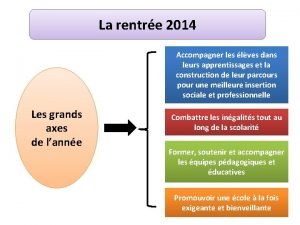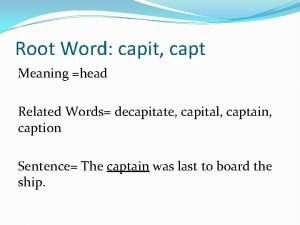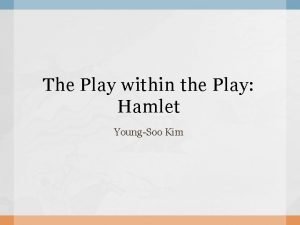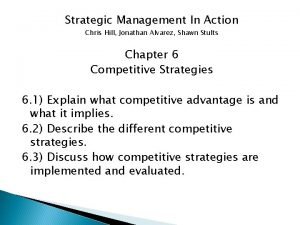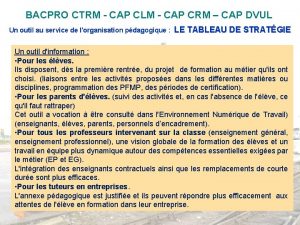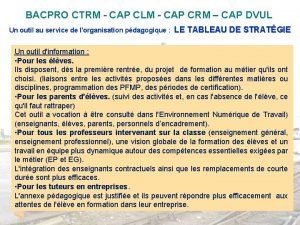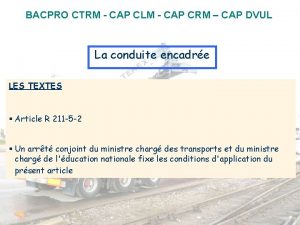CAP post2020 state of play Caroline Pottier Head










- Slides: 10

CAP post-2020 state of play Caroline Pottier Head agriculture sector– Land use and management unit DG Environment European Commission 1 March 2018

CAP post-2020 – societal demand • CAP public consultation - (the second biggest consultation ever after the Nature REFIT) : • The 322 000 contributions included a major mobilisation by environmental NGOs and some national campaigns led by farmers' organisations • That the CAP should deliver more environmental and climate was agreed by 92% of non-farmers and interestingly by 62% of the farmers. • According to the respondents, the biggest environmental challenge is biodiversity (21%), followed by soil degradation (19%), the use of pesticides and fertilisers (18%) and the erosion of genetic resources (16%).

CAP post-2020 – what the Commission has already agreed on MFF Communication of 14. 2. 2018 (COM(2018) 98): "A modernised Common Agricultural Policy will need to support the transition towards a fully sustainable agricultural sector and the development of vibrant rural areas. A modernised Common Agricultural Policy must enhance its European added value by reflecting a higher level of environmental and climate ambition and addressing citizens' expectations for their health, the environment and the climate.

CAP post-2020 – what the Commission has already agreed on COMMUNICATION "THE FUTURE OF FOOD AND FARMING"(COM(2017)713 final, of 29. 11. 2017) • "The Common Agricultural Policy (CAP) should … lead a transition towards a more sustainable agriculture" (page 4) • ". . a modernised CAP should enhance its EU added value by reflecting a higher level of environmental and climate ambition, and address citizens' concerns regarding sustainable agricultural production. " (page 7) • Result-driven policy design including the development and application of solid and measurable indicators and of a credible performance monitoring and reporting" (page 10)

CAP post-2020 – what the Commission has already agreed on COMMUNICATION "THE FUTURE OF FOOD AND FARMING"(COM(2017)713 final, of 29. 11. 2017) • "Any new CAP should reflect higher ambition and focus more on results as regards resource efficiency, environmental care and climate action. " (page 18) • "When preparing CAP strategic plans, the Member States will take into account their planning tools adopted emanating from EU environmental and climate legislation and policies. [Such as the Management Plans and Prioritised Action Frameworks for Natura 2000, River Basin Management Plan, Air Quality and Air Pollution Programmes, Biodiversity Strategies. ]

Result-oriented policy implementation • Need to be clear on what we want to achieve at EU level = specific environmental objectives • Payments to depend on results. Importance of the evaluation of performance. Key issues: • environmental targets according to environmental legislations and policies. • linking expenditure to environmental result indicators

CAP strategic plans • MS planning according to environmental planning tools. Environmental challenges, needs, and types of intervention already defined in RBMPs or other tools not to be re-invented. • Need for environmental safeguards, at least level of the current CAP. Introduction of environmentally harmful subsidies excluded (EU Treaty principles of preventive action)

Green architecture of the new delivery model • Reinforced cross-compliance? • Voluntary commitments? • Mandatory practices?

Conclusion • The CAP cannot scale down its environmental ambition and performance for the sake of simplification or pragmatism. • Important that agricultural managing authorities and environmental authorities work hand in hand • Earmarking aspect will be crucial. • Cr Hogan has called MS for quick preparation of CAP strategic plans (because of link with 1 st pillar): need for environment to be involved at all levels.

Thank you for your attention ! Caroline. pottier@ec. europa. eu

